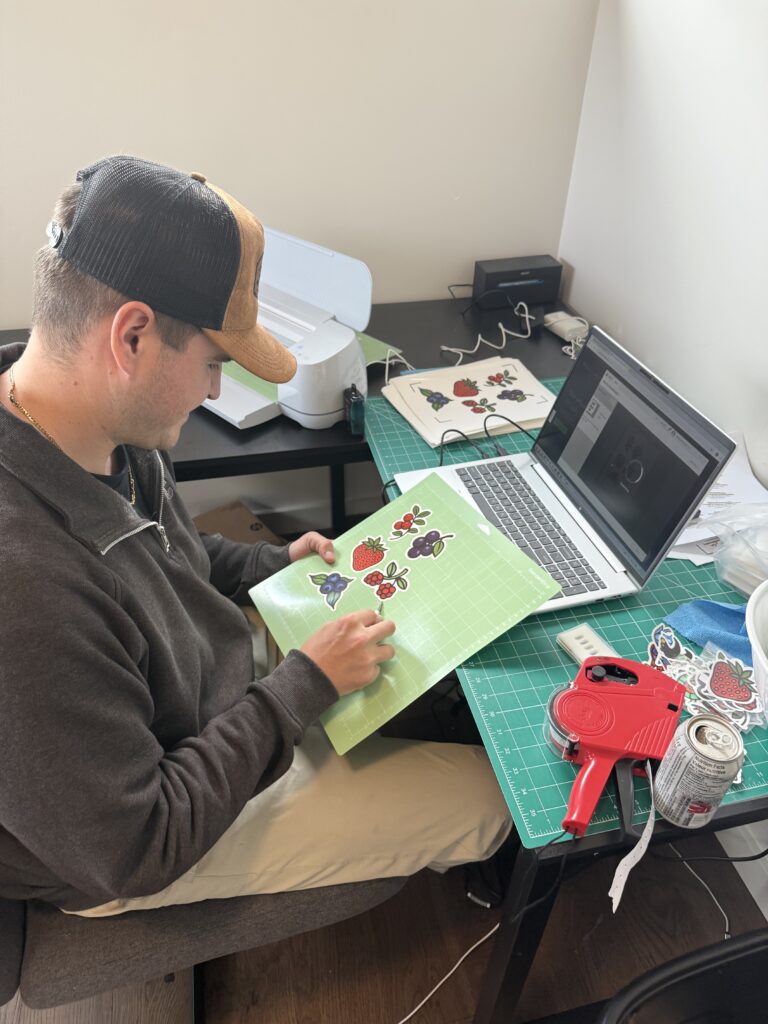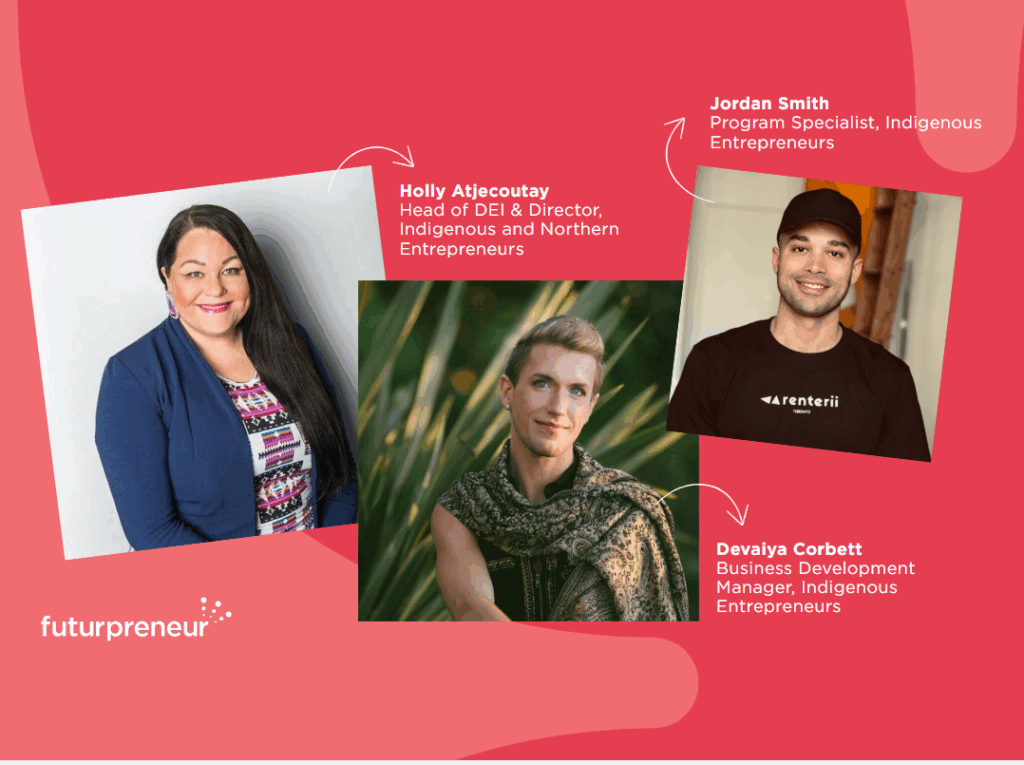
- Entrepreneurship
- Futurpreneur(s) and partners
- Social impact and sustainability
Truth, reconciliation & entrepreneurship: Amplifying the voices of Indigenous founders
In September, communities across Canada mark National Day for Truth and Reconciliation. It is a time to reflect on and learn from a difficult history and take action to advance reconciliation. At Futurpreneur, we proudly support the Truth and Reconciliation Commission of Canada’s Call-to-Action #92, focusing on Indigenous economic empowerment.
We believe entrepreneurship is a transformative tool for Indigenous self-determination and economic reconciliation, fostering growth and prosperity. The Indigenous Entrepreneur Startup Program (IESP) was created to support young Indigenous entrepreneurs as they build businesses that reflect their values and contribute to thriving communities.
To better understand the role of entrepreneurship in advancing reconciliation, we spoke with three young Indigenous entrepreneurs supported by Futurpreneur. We asked them to share their personal and professional journeys and how their businesses are contributing to a stronger future for their communities.
Finding purpose and pride in entrepreneurship
Branden Bruyere, who is from Biigtigong Nishnaabeg (in Northwestern Ontario), is the founder of Giniw Printing Co., a side business he runs alongside his full-time work with the Pic River Development Corporation. He started his business after recognizing a gap for local printing services in his community.
“I had a vision for my business, but I needed support to make it a reality,” Branden says. “Futurpreneur’s loan financing gave me the capital I needed, and the mentorship has been a huge resource when challenges come up.”
Giniw Printing Co. has already grown beyond Branden’s expectations, and he takes great pride in serving local First Nation bands and businesses, as well as nearby Pukaskwa National Park. His dream is to grow the business to a full-time operation that provides employment and opportunities for his community.
For Branden, truth and reconciliation means moving forward together to build lasting, respectful relationships between Indigenous and non-Indigenous communities. It is about honouring the struggles of ancestors while also walking with pride today.
“I have seen how important it is to work side by side and support one another, and I want to continue growing those lasting relationships in both business and community,” he says. “It means sharing traditions and celebrating each other’s successes. Friendship grows when we cheer for one another.”

From a personal journey to a mission to empower
Jacinda Belisle, an Ojibwe woman with ancestry from Batchewana First Nation in Northern Ontario, is the founder of Lilies Pages, a planner and stationery brand. The business was born during a financially and emotionally difficult time in her life.
“Everything pointed back to planning, but I couldn’t find the right tools to organize my thoughts, goals and next steps,” Jacinda says. “What started as a personal need became a business that helps others find clarity and purpose through beautifully designed planners and tools.”
For Jacinda, truth and reconciliation is deeply personal. She reflects on what her grandmother, a residential school survivor, endured, and the “what ifs” of a culture lost to shame.
“Truth and reconciliation means acknowledging those painful truths and working toward healing and restoration,” she says. “While Lilies Pages is not inspired by Indigenous women specifically, it is built on the belief that every person has a story worth telling. In that way, it contributes to reconciliation by helping people reconnect with themselves and their values, including cultural identity when that’s part of their journey.”
Jacinda wants to share a message of empowerment with other Indigenous entrepreneurs. “Your story matters. Your voice is powerful. You don’t need to fit a mold — your path is valid, and your culture is a strength.”

Healing intergenerational trauma through business
Dr. Sadie Laronde is an Anishinaabe Ojibwekwe from Teme-Augama First Nation. She is the founder of The Effect Healing Collective, a trauma-informed healing centre in Ottawa. Her vision is to decolonize healthcare by blending chiropractic care with a wholistic, Indigenous worldview.
“I recognized the limitations of conventional, extractive healthcare models,” she says. “Inspired by my own healing journey and cultural teachings, I launched The Effect Healing Collective to bring accessible, collaborative and culturally grounded care to my community.”
For Sadie, truth and reconciliation is a path to reconnecting with our collective humanity. In her business, it shows up as creating a decolonized healthcare model, centering values of equity, community and cultural safety. She encourages Indigenous youth to see their cultural knowledge as strength.
“Entrepreneurship has the power to advance truth and reconciliation by demonstrating Indigenous ways of doing business, ways that are grounded in respect, reciprocity and sustainability,” Sadie says. “My hope is that others see entrepreneurship not only as a path for personal success, but also as a way to repair relationships, build generational wealth and strengthen our communities for the future.”

Entrepreneurship as an act of reconciliation
Futurpreneur is honoured to walk alongside entrepreneurs like Branden, Jacinda and Sadie. Their stories illustrate the power of entrepreneurship as a tool for self-determination and economic reconciliation.
Holly Atjecoutay, Futurpreneur’s Head of Inclusive Impact and Director of Indigenous and Northern Entrepreneurs, reflects on this deeply personal connection. “Historically, Indigenous economies were egalitarian, independent and flourishing, akin to modern-day entrepreneurship,” she says. “These ways were lost with colonialism. Indigenous Peoples possess a blood memory of entrepreneurship; it comes naturally to so many Indigenous youth.”
“At the foundation of Indigenous economic prosperity and reconciliation is entrepreneurship. We are witnessing the revitalization of Indigenous economies, reclaiming our sovereignty and space within the broader Canadian economy. Our all-Indigenous team works alongside young Indigenous entrepreneurs, building tailored programs and connecting them to valuable resources and supports.”
Starting your business journey
The stories of these entrepreneurs show that businesses are more than a service or product. They are a reflection of culture, resilience and hope.
The Indigenous Entrepreneur Startup Program (IESP) provides start-up loan financing and up to two years of mentorship, supported by an Indigenous team, offering access to tools and networking.
If you are an Indigenous entrepreneur, ages 18-39, anywhere in Canada interested in starting, buying or growing a business, you can learn more about a loan with mentorship and resources from the Futurpreneur Indigenous Entrepreneur Startup Program. Click here to learn more.


